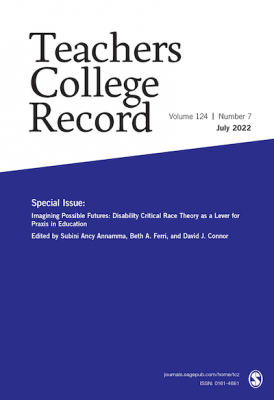School of Education Associate Dean for Research Beth Ferri has co-edited a special issue of Teachers College Record (TCR) on Disability Critical Race Theory (DisCrit), along with her colleagues Professor Subini Ancy Annamma of Stanford University and David J. Connor of Hunter College.
Access the Journal In their introduction to TCL volume 124, issue 7—“Imagining Possible Futures: Disability Critical Race Theory as a Lever for Praxis in Education”—Ferri, Annamma, and Connor begin by revisiting the “seven tenets of DisCrit” and citing the discipline’s truncated intellectual geneology.
In their introduction to TCL volume 124, issue 7—“Imagining Possible Futures: Disability Critical Race Theory as a Lever for Praxis in Education”—Ferri, Annamma, and Connor begin by revisiting the “seven tenets of DisCrit” and citing the discipline’s truncated intellectual geneology.
Next, the editors trace the importance of the TCR special issue, recognizing the mutually constiutive oppressions of racism and ableism before describing the contributions of the eight featured articles. Each article links DisCrit theory to engaging praxis through empirical research and/or theoretical engagements examining higher education, teacher education, state standards, k-12 education, carceral education, and international education.
“By taking on racism and ableism across disciplinary boundaries and geographic borders, the contributors to this special issue break open new possibilities,” the editors note.
“Since our original DisCrit article, my collaborators and I have published one article, two edited books, and two special journal issues,” adds Ferri. “We’ve sought to establish DisCrit as a sibling of critical race theory and disability studies, making room for rising scholars to push and expand DisCrit.”
TCR DisCrit Special Issue
Table of Contents
- “Theorizing Racist Ableism in Higher Education” | Danielle Mireles
- “Seeing the Unseen: Applying Intersectionality and Disability Critical Race Theory (DisCrit) Frameworks in Preservice Teacher Education” | Ebony Perouse-Harvey
- “’We Still Miss Some of Them’: A DisCrit Analysis of the Role of Two 4-Year Hispanic Serving Institutions in Racially Diversifying the K–12 Teaching Force” | Tara Schwitzman-Gerst
- “Emotional Geographies of Exclusion: Whiteness and Ability in Teacher Education Research” | Maggie Beneke, Molly Baustien Siuty, and Tamara Handy
- “(Un)Standardizing Emotions: An Ethical Critique of Social and Emotional Learning Standards” | Caroline T. Clark, Alyssa Chrisman, and Suzanne G. Lewis
- Counternarratives as DisCrit Praxis: Disrupting Classroom Master Narratives Through Imagined Composite Stories” | Mallory A. Locke, Valerie Guzman, Armineh E. Hallaran, Migdalia Arciniegas, Tanya E. Friedman, and Adela Brito
- “Solidarity Incarcerated: Building Authentic Relationships With Girls of Color in Youth Prisons” | Brian Cabral, Annie Le, Brianna Harvey, Jennifer M. Wilmot, and Jamelia Morgan
- “The Construction and Embodiment of Dis/Ability for North Korean Refugees Living in South Korea” | Yosung Song G’18 and Justin E. Freedman G’18
